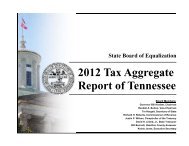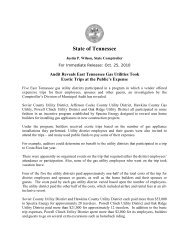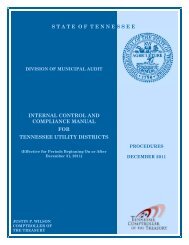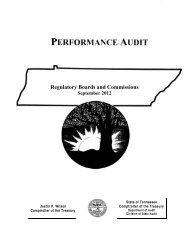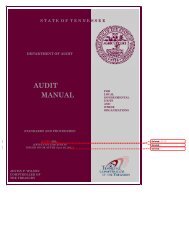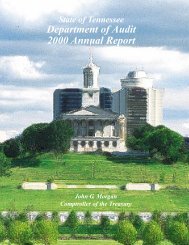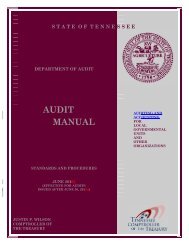Because constables are not regulated, POST <strong>Commission</strong>/LETA management believesthat counties that choose to use constables open themselves up to potentially massive liabilities.State Attorney General Opinion No. 00-050, dated March 20, 2000, concludes that “a countywould probably be liable for torts committed by a constable that fall within the GovernmentalTort Liability Act . . . <strong>and</strong> for civil rights violations under 42 U.S.C. 1983.”The POST/LETA opinion of the role <strong>and</strong> importance of constables in Tennessee is notshared by one of the profession’s leading advocacy groups, the Tennessee Constable Council(TCC). The TCC was created in 2003 as a proactive agency with the primary goal of training allconstables <strong>and</strong> thereby taking them to a new, more professional level. TCC managementbelieves constables serve an important role, especially in rural areas where the sheriffdepartments may not have a significant presence. TCC management emphasized that whileconstables, on a daily basis, are not on the front lines, their role is essential in some areas.Because constables do not respond to calls like sheriff deputies, they are free to spend more timeon patrol in areas where problems might occur. In some counties, like the TCC president’s homecounty of Fentress, constables reportedly serve about 90 percent of court papers (i.e., civilprocesses, garnishments, bank levies, detainers, <strong>and</strong> summons). According to TCC management,the court system relies extensively on the constables. In his county, he says the TCC has workedto make the constable system work. As a result, Fentress County has passed a resolution thatpays for its constables’ fuel costs if they complete 40 training hours annually.To promote st<strong>and</strong>ardization <strong>and</strong> improve the professional nature of the position, the TCCsupports legislation that would require training <strong>and</strong> certification for all constables. The TCCcurrently oversees three training schools in Tennessee, in Roane, Sevier, <strong>and</strong> Warren counties.Each of the three schools annually graduates two classes of about 30 constables, for a total ofabout 180 constables each year. The schools provide a 40-hour in-service training that coversissues related to the role of a constable. For example, according to TCC management, theschools provide the same Emergency Vehicle Operation Course required by law <strong>and</strong> provided inPOST training. Other POST-similar courses are modified to meet the needs of constables. Theconstable training instructors are all POST-certified, <strong>and</strong> also provide some training for sheriff<strong>and</strong> police departments in the state. The TCC provides constables with IDs <strong>and</strong> patches.The 180 constables who receive annual training, however, represent less than half of allconstables in the state. The TCC supports required annual training for all constables, but it lacksthe authority to require it. While the TCC trains constables, neither the agency nor the training isrecognized by the POST <strong>Commission</strong>. The TCC proposes that it be allowed to continue to trainconstables in a 380-hour POST-approved course, <strong>and</strong> then have officers take the same POST<strong>Commission</strong> test as all officers before receiving POST <strong>Commission</strong> certification. The POST<strong>Commission</strong> would maintain all records of training as it does with all POST-certified officers.TCC management believes the TCC could train constables in a cost-efficient manner.According to TCC management, the POST <strong>Commission</strong> was willing to work with theTCC in support of the Constables Accountability Act of 2006. However, the POST <strong>Commission</strong>insisted that as a requirement for certification, constables complete the same basic training asPOST-certified officers. TCC management does not believe that basic training is necessary for18
constables. In addition, because constable is a part-time position <strong>and</strong> constables typically workother jobs, constables would be unable to commit to the ten weeks required for attending basictraining.On the other h<strong>and</strong>, TCC management believes that required st<strong>and</strong>ardized statewidetraining for constables is necessary to professionalize the position. TCC managementemphasized that many constables are retired law enforcement officers, some even being formerFBI agents. Others however, according to management, are individuals who merely want theright to carry a gun <strong>and</strong> refuse to even consider training.While constables are state officers, they are elected locally, <strong>and</strong> legislation is written sothat counties may decide to maintain or eliminate the position. The county commissions inTennessee can decide to abolish the use of constables in their respective jurisdictions, <strong>and</strong> thensubmit that information to the General Assembly, which will then pass necessary legislation toeffect that change.MONITORING LOCAL LAW ENFORCEMENT AGENCIESThe <strong>Peace</strong> <strong>Officer</strong> <strong>St<strong>and</strong>ards</strong> <strong>and</strong> <strong>Training</strong> (POST) <strong>Commission</strong> staff’s efforts to monitorlocal law enforcement agencies have improved since 2007. Reviews of these local agencies areconducted to compare personnel files to actual training records, <strong>and</strong> also to pay supplements toverify training for POST <strong>Commission</strong> compliance <strong>and</strong> to ensure officers have met the criteria toreceive the annual pay supplements that the agencies request. (In calendar year 2005,approximately 360 law enforcement agencies submitted requests for payment of incomesupplements for officers.) The ability of the POST <strong>Commission</strong> to monitor these agenciesappears to have improved with the hiring of three investigators in the latter part of 2006 <strong>and</strong>early 2007. The agency’s earlier monitoring efforts were inconsistent (see table below), <strong>and</strong> staffwas not routinely following up on the reviews to determine if the local agencies had takenactions to correct problems identified.Calendar Year Reviews/ Investigations2001 12002 02003 82004 112005 312006 62007 10The new investigators began conducting reviews in 2007, <strong>and</strong> half of the reviews (five often) during that year were r<strong>and</strong>om reviews. The other five were the result of a complaint or newsreport, a request from a local official, or earlier monitoring by <strong>Law</strong> Enforcement <strong>Training</strong>Academy (LETA) staff. In addition, seven of the ten reviews found that follow-up action wasnecessary, <strong>and</strong> in six of the instances the investigators returned to the agency to determine if19



